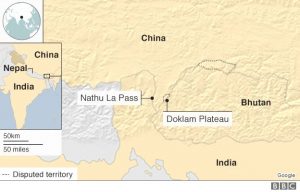
Photo : BBC
A trip scheduled annually for Indian and Nepalese journalists to travel to Tibet has been cancelled by Chinese authorities following border disputes between China and India in the Dokklam area in Sikkim and Bhutan. Beijing has also ordered the suspension of the Kailash Mansarovar pilgrimage route through the Nathu La pass. The Nathu La pass was to be traversed by 7 of the 25 groups of pilgrims due to travel to Kailash over the next four months. These pilgrims have been left in the lurch by the decision of the Chinese government. The other 18 groups will cross the Lipulekh pass in Uttarakhand which remains open.

Lipulekh pass in Uttarakhand
India and China have been at loggerheads over border issues for decades. Tensions famously flared up in 1962 when war broke out and China heavily defeated the Indian military. The current issue stems from Chinese attempts to extend a border road through the Doklam plateau, an area which is claimed by both Beijing and the Bhutanese government in Thimphu. India backs Bhutan’s claims to the area but the Chinese refer to an 1890 treaty signed by the British and Sikkimese which they claim places the area under their control as a part of Tibet. Chinese officials have recently said that India should learn “historic lessons” from its defeat in the 1962 war. Statements to which Indian defence minister Arun Jaitley responded by stating “India in 2017 is different from India in 1962.”
Indian officials worry that, if linked by Chinese roads, Dokklam could become a launching point for a Chinese attack on the vital Siliguri corridor, also known as the “Chicken Neck”. This strip of Indian land, just 14 miles wide at one point between the Bangladeshi and Nepalese borders, is a central node which connects Bhutan, Sikkim, Nepal and the Seven Sister States to the rest of India. All land trade between the 40 million plus residents of the North-Eastern States and the rest of India goes through the Chicken Neck due to the lack of a free trade agreement between India and Bangladesh.
Despite these concerns, Sreeram Chaulia, the author of Modi Doctrine :The Foreign Policy of India’s Prime Minister says that “the threat of an actual war is zero. Right now, all that China is doing is making noises…with the help of an aggressive media. They may keep reminding us of 1962, but the fact is that the situation is now completely different. Both India and China are nuclear powers and the latter cannot, therefore, risk a fully fledged war.”

Map showing the location of Darjeeling
The really pressing issue in the Chicken Neck region is the situation in Darjeeling where the Gorkha Janmukti Morcha (GJM) has renewed decades old calls for a separate Gorkha land state. Press reports of border skirmishes between Chinese and Indian soldiers play into the hands of West Bengal Chief Minister Mamata Banerjee, who frequently derides those calling for Gorkha land as Maoists and attempts to undermine the movement by suggesting that it is the result of Chinese “interference”. The unrest in Darjeeling, where shops, hotels, schools and restaurants are closed indefinitely, has been running parallel to the reports of border skirmishes between India and China since mid-June.




 Print
Print Email
Email